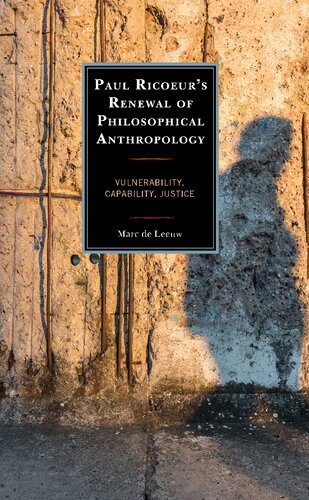

Most ebook files are in PDF format, so you can easily read them using various software such as Foxit Reader or directly on the Google Chrome browser.
Some ebook files are released by publishers in other formats such as .awz, .mobi, .epub, .fb2, etc. You may need to install specific software to read these formats on mobile/PC, such as Calibre.
Please read the tutorial at this link: https://ebookbell.com/faq
We offer FREE conversion to the popular formats you request; however, this may take some time. Therefore, right after payment, please email us, and we will try to provide the service as quickly as possible.
For some exceptional file formats or broken links (if any), please refrain from opening any disputes. Instead, email us first, and we will try to assist within a maximum of 6 hours.
EbookBell Team

4.1
100 reviewsInPaul Ricoeur's Renewal of Philosophical Anthropology: Vulnerability, Capability, Justice, Marc de Leeuw argues that Ricoeur’s philosophical project integrates the anthropological tradition while renewing its importance as ahermeneuticanthropology of human capability. Ricoeur posits that our cogito is neither its own absolute master, nor fully transparent to itself, inflicting a “wound” (brisé) and fracturing the center of Cartesian self-certainty. But the Nietzschean disillusionment that ensues does not simply amount to a victorious anti-cogito; it opens another path towards self-understanding. In place of the direct route of intuition is found a more complex way forward, one guided by interpretation. The task of philosophical anthropology is to understand the human through its interpretative, critical, and imaginative ability as well as its capacity toacttowards, with, and for others; the interpretation of the world in front of us, the interpretation of “who we are,” and the interpretation of what it means to be among others (as "other selves") coalesces in an anthropology that binds the question of the self to a moral, ethical, and political project, one aiming to reflect our existence-in-common. For Ricoeur, the basic question of our subjective and normative “standing” demands a fundamental response—a response toward our own otherness and to responsibilities triggered by the appeal of Others. In both cases, our vulnerability is inescapable: we can never have an absolute self-knowledge nor an absolute knowledge of Others. Ricoeur turns this fundamental aporia into anaffirmativephilosophical anthropology of human action, attestation, and justice.